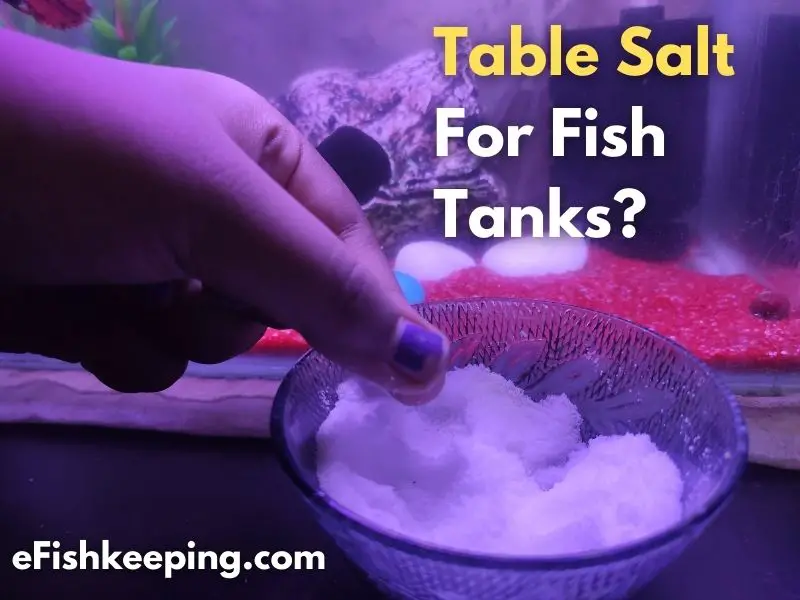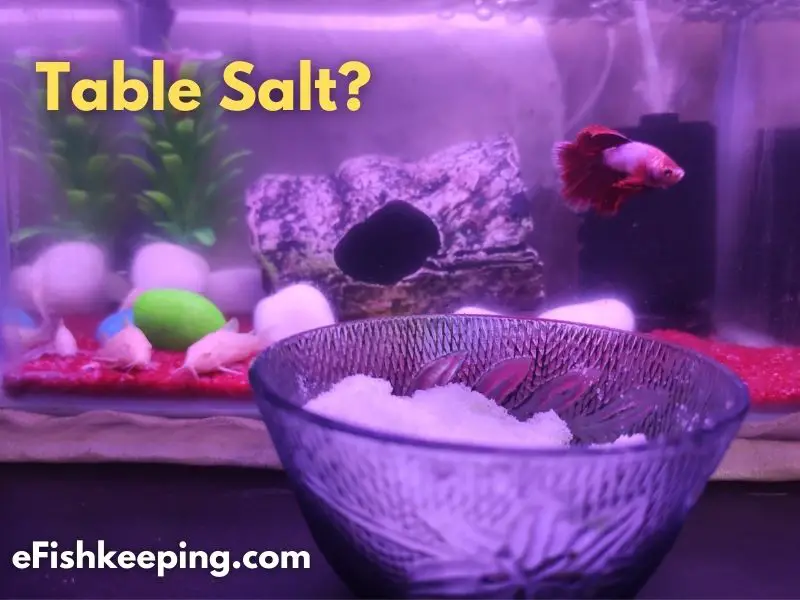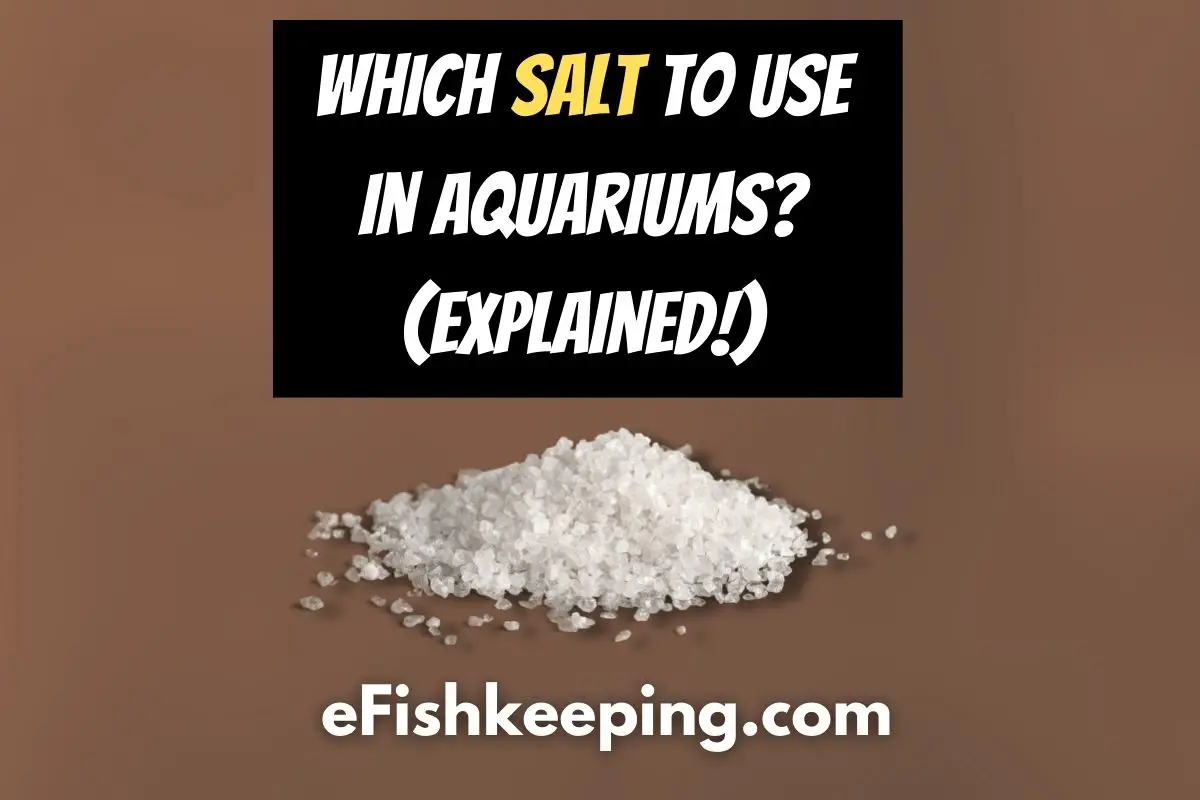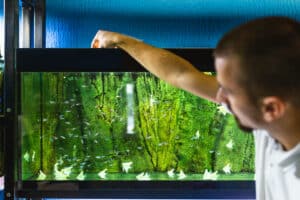Salt usage is well-known in the aquarium hobby for treating fish diseases. Almost all of us have table salt in our homes. So you might be wondering, why look for anything else if we already have it? But is that simple? Let’s see!
Can You Add Table Salt To A Fish Tank?

As a general rule, you can add table salt to a fish tank as long as it is non-iodized. Usually, table salts used in our homes is iodized salt which can be good for humans but not necessarily for fish, so rock salt or kosher salt is the best alternative.
Continue reading till the end to clarify all your doubts regarding the usage of table salt in aquarium and which salt to use for your aquariums.
Is Table Salt Safe For Aquariums?
Although there is a perception of table salt being very harmful for aquariums, generally speaking, it is ok to use it for fish. In a study, no major difference was found in the mortality of fish that were treated with iodized in comparison to the non-iodized salt.
The primary aim of the study was to investigate whether the usage of iodized salt for dips and baths can potentially increase the mortality of fish or not. This study was conducted on three commercially essential fishes:
- Koi
- Guppy
- Jack Dempsey
Under this study, the fish were kept in a salt bath or a salt dip. And in this process, either the iodized or the non-iodized salt was used. The observations for the clinical signs of death or the toxicity of iodine were done.
And finally, they didn’t find any notable variation in the mortality of the fish treated with iodized salt compared to the non-iodized salt.
Also, it is highlighted that using iodized salt for both the baths and dips process seemed safe in all the three species they conducted the test.
Now, I researched more and came across another study, that is about the acute toxicity of povidone-iodine (Betadine) in common carp.
(Quick Info: Povidone-iodine (Betadine) is a complex of the bactericidal agent iodine and the carrier molecule povidone.)
The aquatic organisms are sometimes exposed to pollutants like pharmaceutical residues. The objective of this study was to get the lethal concentration of povidone-iodine for the fish.
After conducting their study, they finally concluded that betadine is non-irritant and non-toxic at the lower concentration for the given species. And also found that it has a short half-life in aquatic conditions.
Should I Use Table Salts In Aquariums?

You should avoid using table salts for aquariums to be on the safer side. Although I already discussed how the study didn’t find any significant difference between iodized and non-iodized salt, it is always better to be safe than sorry.
Author’s Thoughts: Should You Use Table Salts In Aquariums?
Before I tell my thoughts, please note that I’m not a vet and not a fish expert either. I’m just like you, an aquarium hobbyist who enjoys this awesome hobby with his family every day. (I first stepped into the world of fishkeeping in my childhood, inspired by my dad)
So, personally speaking, it is ok to use table salt seldom or for some emergency purpose when aquarium salt or rock salt is not present. In my personal experience, it is highly unlikely for fish to die just by adding table salt.
As far as I researched, I didn’t find any clear evidence supporting the claim that iodine is toxic for fish.
I also came across a study evaluating the toxicity effect of betadine (10% solution of povidone-iodine) on the gill tissue of Oranda Goldfish and its survival. In that study, what they found can be summarized as follows:
– In the aquatic environment, Betadine has a short half-life.
– Betadine is toxic to fish at a very high level of concentration.
– However, practically, it is non-toxic and useful in disinfecting the aquatic environment.
Anything given in excess can be harmful to fish. But I think the amount of iodine in table salt will be quite less to be considered toxic for your fish.
I have only been using the normal table salt for my (freshwater) fish aquariums. I generally add them whenever I do some major water change. Or if I notice some fish disease. And I didn’t notice any significant impact or ill-effects on my fish yet!
Again, I’m not a vet so please research accordingly from your end before taking any step concerned with the health of your fish. I’m just telling you what I have observed myself. Hope that helps you!
I also recommend you to watch this video on the truth about the iodized table salt in aquaria for more understanding:
Which Salt To Use In My Aquarium?
You should use rock salt or kosher salt for your aquariums because they are generally pure sodium chloride without anything else added to them. However, you can also use table salt, provided it is free of iodine and other additives.
There are different types of salt in our aquarium hobby. And this potentially leads to a lot of confusion, doesn’t it? But don’t worry, that’s why I’m here to solve your doubts.
Understanding The Different Types of Salt Used For Aquariums
1. What Is An Aquarium Salt?

(You can click the above image to check the shown item on Amazon)
Aquarium salt is prepared from evaporated sea salt. It is made specifically for freshwater tanks and doesn’t have iodine or any anti-caking agent.
What can I use if I don’t have aquarium salt? If you don’t have aquarium salt, you can use rock salt or kosher salt. Also, if the table salt is non-ionized and free of any additional additives, you can use it for your aquariums.
2. What Is Kosher And Non-Iodised Rock Salt?

(You can click the above image to check the shown item on Amazon)
These salts are the purest form of sodium chloride. These salts also don’t have any extra additives; that’s why they are the best option and alternative to aquarium salt.
3. What Is Marine Salt?

(You can click the above image to check the shown item on Amazon)
Marine salt or sea salt is different from aquarium salt. It is specifically used to create saline water in marine tanks. Unfortunately, sea salt can cause the death of freshwater fish because of its chemical buffers.
4. What Is Table Salt?
(You can click the above image to check the shown item on Amazon)
Table salt is the normal salt found in our homes used in tasks like cooking. Table salt is different from aquarium salt because it is normally treated with iodine.
5. What Is Epsom Salt?

(You can click the above image to check the shown item on Amazon)
Epsom salt is basically magnesium sulfate. The Epsom salt is mainly used to treat problems in fish like constipation, dropsy, and swim bladder disease.
When Should You Use Salt In Aquariums?
Here are some of the conditions in which you can use salt in your aquarium:
- To prevent nitrite poisoning in a newly set up tank. (Adding some salt in a newly set up tank helps prevent nitrite poisoning in your fish)
- To reduce external parasites (Salt can also be helpful in reducing many external parasites)
When Should You NOT Use Salt In Aquariums?
Here are some of the cases in which you shouldn’t use salt in aquariums:
- If you have live plants. (Plants can get affected even by a small dosage of salt, and hence it is good to separate the sick fish in a different hospital tank before you start the treatment)
- If you have a scaleless species of fish! (Scaleless fish species aren’t that tolerable to salt due to lack of scales. You can avoid adding salt in your tank if it has tetras, corydoras catfish, or any other scaleless fish species.)
How Often Can You Use Salt In My Aquariums?
Generally, you should use salt in freshwater aquariums whenever you start a new aquarium and whenever you do a water change. However, don’t use salt on a daily basis and use it only sparingly when there is an actual need for it.
Final Thoughts
In short, you can use rock salt or kosher salt for your aquariums because they are typically free of any additives. You can also use table salt if it is non-ionized. That’s it!
I hope you found this guide helpful. Want to support me? Please share this work with more people. Thanks 🙂
Read Next: Can You Vinegar To Clean Fish Tanks? Will It Damage Silicone?
Sources:
- Taylor & Francis Online – Use of Iodized Versus Non-iodized Sodium Chloride for Freshwater Fish
- Pollution – Acute toxicity of povidone-iodine in common carp
- PubMed – Can Betadine act on the survival rate and gill tissue of Oranda Goldfish
- Science Direct – povidone iodine
Hi! I’m Praveen Ghoshal, the founder of eFishkeeping.com. Inspired by my Dad, I got interested in fishkeeping when I was a kid. Since then, I have been involved with this hobby. Currently, I have 3 fish tanks at our home, and I enjoy this hobby with my full family. Read more about me here.







